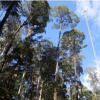
Agroforestry knowledge exchange in Japan
Posted 17 April 2023
Private Forests Tasmania agriforester Molly Marshall recently returned from an Agroforestry knowledge exchange in Japan.
Over 12 days, Molly travelled around central Honshu with the group of Australian forest industry stakeholders including Rowan Reid, Sharlee Dunolly-Lee, Andrew Stewart, Rob Youl, Jacinta Douglas, and Kazuki Kagohashi.
The group visited and interacted with an array of land managers, foresters, farmers, entrepreneurs, sawmillers and government officials.
Through the group’s travels they were able to understand the complexities and opportunities which the forestry sector within Japan faces.
All the forests the team saw were dominated by softwoods planted post World War 2, with some areas having some minor native hardwood species regenerating.
Some of the complexities which the group were able to better understand through their visit were the small scale of the land parcels (often less then 1ha), the operational constraints (terrain and weather) and absentee landowners (often of an elderly age).
Despite these factors, however, the group was able to see innovation occurring and the multiple values that their forests are managed for, such as maple syrup, sap water, tea, essential oils, education, biodiversity, timber, and shiitake mushrooms.
The innovation continued across the whole supply chain with the group being fortunate enough to meet Mr Hironari Inoue of (Hida Goboku Inc).
This local family run business was completely vertically integrated along the supply chain from sawmilling through to owning and operating a construction business.
The local Kiyomi sawmill pictured below runs year-round of 5ha of trees …. how incredible is that?

Whilst the group learnt a lot about value adding products, small scale harvesting and how to overcome the challenges of absentee landholders, the group also provided insights from the Australian landscape.
It is hoped that into the future that the connection built with Japan continues with perhaps some of the Japanese land managers coming to Australia to understand the complexities and opportunities we face.
Molly would like to thank Global Landcare for facilitating such an educational knowledge exchange and further acknowledge the enormous efforts of Global Landcare vice-chair Rob Youl and Kazuki Kagohashi, who is also a board member with Global Landcare, without them the trip would not have been the success it was.
Share this Article
Latest Articles
-

17 September 2025
Celebrating excellence at the Tasmanian Timber Awards
-

17 September 2025
Forest Practices Authority Research Update Day
-

13 August 2025
Have you seen our Stems for CO2 Project signage on the Midlands Highway?
Archives
- ActivAcre hits milestone, calls for more farmers to get on board
- Napier's leading the way in sustainable forestry and carbon-neutral farming
- Sound science needed to assess carbon impacts of timber harvesting
- Newly appointed TFFPN Board of Directors
- Graduate Certificate of Forestry Scholarship
- Forestry Australia Mentoring Program 2025
- Forest Industry Roundtable planning for the long term
- Eagle Management Constraint Period extended
- Successful private native forest management celebrated
- $15 million investment in new ship loader to boost Bell Bay's forestry exports
- Standing with Tasmania's forestry industry: buy local
- TFPA: Tasmanian Freight Equalisation Scheme needs a ground-up review
- AFCA Gala Dinner celebrates industry excellence
- Fire permits now required Statewide
- Forest leaders hone skills in sustainable native regrowth management
- Tasmanian forests and the carbon market: Barriers and opportunities
- Spring is the time for fuel reduction burning
- Primed for Growth: A situation analysis of the Tasmanian Forest and Wood Products Sector
- Audit requirements cut for low-risk plantation projects
- Guidance and support for landowners after damaging winds
- Forestry Australia welcomes further definition of active forest management
- Farm & Forest Mapper Tool highlighted at Rural Youth Tasmania's Young Farmer of the Year competition
- Senate Select Committee inquiry into the Tasmanian Freight Equalisation Scheme
- Timberlink announces new wood composite products brand
- Newly developed protocol a vital tool for safeguarding forestry industry
- Red Hot Tips: Fire management for Tassie farmers
- Bioenergy: Fuelling industries with trees
- Harvesting trees: What you need to know
- Shelterbelts: How are they contributing to farm systems?
- Infill plantings and remnant vegetation: Why biodiversity depends on a thriving understory
- Plantation planning: The key to a successful plantation
- Exciting interactive forestry knowledge hub launched
- $450,000 farm forestry grant recipients revealed



